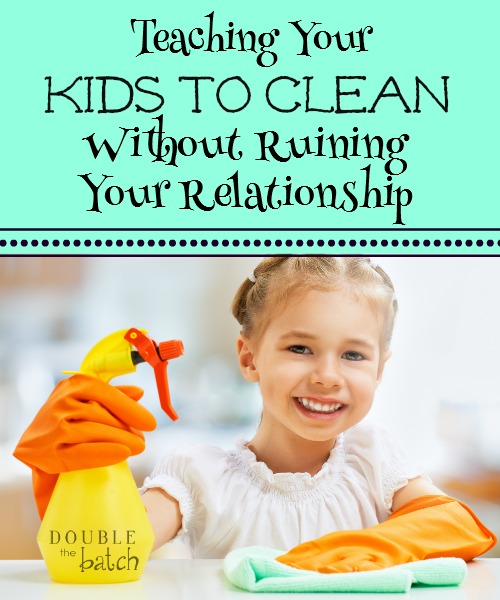I know you feel me. Everyday you are faced with the same epic battle in your mind: do I just clean this house myself or go through the tedious, tortuous experience of having my kids clean it? Because we all know is usually easier just to do it all yourself than to get the children involved. Teaching a kid to clean and making sure they actually do it is most often an exhausting, aggravating experience for both mother and child. Some days if feels like I could fight with my children about housework all day long if I chose. And, honestly, there have been many days I have. On those days I have gone to bed (in a house that is still not that clean) exhausted, frustrated, and angry- and so have my kids. I lie in bed those nights thinking, is it worth it? A clean house. Is it worth feeling like this? Maybe I should just do it all myself and avoid all the drama, arguments, and whining that drive me mad.
Then I remember that these little ones will one day have to leave my house and I am determined that they will NOT be the college roommate who drives everyone crazy because they don’t know how to clean up after themselves. They WILL learn to clean even if it kills me… but I don’t want it to kill me. So, I came up with a plan that is working for me. I am not going to tell you my specific cleaning plan, because I think you have to come up with one that meets the needs of your family. And you would be so unimpressed with my hand-drawn, un-Pinterest-like job chart that you might not even read the rest of this article. (-; What I am going to share with you, though, are some guiding principles I used to come up with my plan that are allowing me to teach my kids to clean without ruining our relationship.
Principle 1- Don’t overwhelm them. You know what it is like to have a to-do list a mile long. You don’t know where to begin and feel defeated before you even start. It is important to make sure the chore list you are giving your children is reasonable for their age and stage of development as well as for the amount of time available so they don’t end up feeling the same way. During the school year, there is precious little time to spend together as a family. Don’t spend the majority of that precious time on chores. If your kids feel like they can get the job done in a reasonable amount of time, they are more likely to get it done.
Principle 2- Don’t nag them. Oh my goodness, this one sooo hard! I am still working on mastering it. I know my incessant reminders to do their chores are not effective and my tone drives them crazy. They start to tune me out after a while. It takes more restraint to teach your kids responsibility through natural consequences than to follow them around telling them over and over what they should be doing. But one way teaches them to be responsible and the other teaches them to rely on others to tell them what to do all the time. One way gives them motivation to get the job done quickly and the other teaches them that they can procrastinate getting it done with no real consequence other than their mother’s annoying voice ringing in their heads.
Nagging sucks the life out of me and fills me with negative emotions. Natural consequences don’t require as much energy- just more courage to actually follow through with them. Have a consequence in place if they choose not to do their chores and make them aware of it from the very beginning. It needs to be motivating to them, so choose wisely. Every kid is motivated differently, so you may need different consequences for different children. My daughters each have a bin full of toys that is always up for grabs if they choose not to do their chores. I lock it up until they earn it back by doing their chores the first time they are asked for a certain time period. Some children are very motivated by losing the opportunity to play with friends. Figure out what will work for your kid and let the consequences do the nagging.
Principle 3- Choose Your Battles. It seems like my children’s bedrooms can go from spotless to filthy in a matter of minutes. We could spend all day, every day fighting about cleaning their room. I just couldn’t do it anymore. So, I decided it was a battle I will only take on twice a week. Every Wednesday and Saturday they are expected to clean their room, but I don’t even bring it up any other day of the week. They are more willing to clean it on those days because they know it isn’t something I am going to constantly demand of them anymore, and we have eliminated so much daily negative interaction by doing it this way.
Principle 4- Break up big jobs into smaller jobs. I ask my girls to help with the dinner dishes five nights a week. Asking one of them to do it all never worked out really well. They would get overwhelmed by it all, and it would take them forever. I had to spend way too much time making sure they got it done when I really needed to be helping them with their homework and getting everyone to bed. But, I want them to know how to really clean a kitchen entirely after a meal. So, I broke it into three parts- unloading the dishwasher, loading the dishwasher, and clearing and wiping the counters and table. Now they each have to help every night, but they are not overwhelmed by it and so they do it more willingly. It gets done faster, because they can all work on it at the same time. And even though they are not doing the whole thing themselves, they are learning how to do every part of cleaning the kitchen.
Principle 5- Show appreciation. It is amazing how much we are willing to do as humans if we just feel appreciated for it. My husband regularly expresses gratitude for the fact that he always has clean clothes in his drawers and closet, and so laundry is not as much drudgery for me as it would be otherwise. Letting our children know that we appreciate their efforts has the same effect on them. In fact, one of the key factors researchers have found in happy families is regular expressions of gratitude for even the simple day to day things. Replace your nagging with appreciation and you will be amazed at the results. A fun reward from time to time when they are being particularly responsible about getting their chores done is also effective.
Principle 6- Let go of perfectionism. If you haven’t already come to terms with the fact that your house is not going to be perfectly clean until your children have left the premise to start lives of their own- it’s time. And when your children do a job, it will pretty much never turn out as well as when you do it. Be okay with that. Let close enough be close enough. When they tell you they have finished a job, nit picking every little thing they missed leaves them feeling discouraged and unappreciated. I’m not saying you let them get a way with doing a half-job. But, carefully choose the tone you use when you bring up things they overlooked. Make it positive. For example, saying, “Oh my goodness- this is looking so good! I only see 3 more things you need to do and then you will be all done!” instead of, “You are NOT done! There are still toys under the bed, garbage all over the floor, and the beds are not made. Get back in there and finish!,” is more likely to motivate them to finish the job. And what is most important is that when you handle it this way, you will both continue to have positive feelings towards each other rather than anger and resentment.
Principle 7- Be adaptable. Don’t be so rigidly tied to the cleaning program you’ve created that you make life miserable for the whole family. If something is not working, change it. If one of your children has a particularly busy day- cut them some slack. And if it has been an exhausting day for everyone, sometimes it is okay to just go to bed and leave the mess for the next day.
Principle 8- Make sure your kids know they mean more to you than a clean house. If all day, everyday, all your kids ever hear from you is cleaning orders, they may begin to feel as though you care more about the house being clean than anything else- including them. Once they are grown, you aren’t going to look back and fondly remember how clean your house was all their growing up years. You are going to remember the moments you spent playing with them, reading with them, teaching them important life lessons, and holding them in your arms. When they look back on their childhood, let them have a head full of those kinds of memories, with your cleaning lessons as a side note, because of how you chose to interact with them on a daily basis.
I wish I could tell you that my children now happily do their chores each day and all is bliss and cleanliness in our home, but that would be a lie. I can report, however, that things are much better than they were. My kids are more willing to do their chores than they used to be, there is a more positive and loving tone in our home than there once was, and cleaning is no longer the at the forefront of all our interactions which makes our home a happier place to be. Good luck to you as you fight your own cleaning battles!
Other posts from Trish you might enjoy: https://www.upliftingmayhem.com/letting-kids-kids/ or https://www.upliftingmayhem.com/earning-childs-trust/

